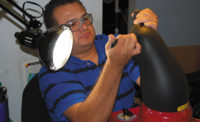One solution is to seek out ergonomically sound hand protection provided by anti-vibration and "impact" gloves, such as the Dr. Spitzer(tm) Impact Glove, also known as Shock-Tek(tm), designed by A. Robert Spitzer, M.D.
Equally important is to make sure you choose the right glove for the job. Gloves that are too tight, too loose, or too thick, for example, can be a common cause of work-related musculoskeletal disorders.
Gloves that are too loose can cause workers to exert additional force to keep the gloves from slipping. Cuffs that are too tight or too stiff can create undue pressure on workers' wrists. After prolonged use, the wrong cuff or a loose-fitting glove can cause carpal tunnel syndrome.
Wearing gloves that are too thick or too heavy is also harmful, impeding rather than helping workers do their jobs. Workers may even wear two gloves on the same hand, each designed to provide a different form of protection. This creates another hazard called over-gloving.
For example, a warehouse employee who constantly wields a box cutter may wear cut-resistant gloves under more slip-resistant leather-palmed gloves. The effect of this over-gloving is overexertion. The worker is literally fighting through the excessive protection to perform his job.
Properly outfitting an entire workforce requires careful attention to the myriad of sizes that might be needed and especially to job-specific features - slip-resistance, heat-resistance, cold-resistance, cut-resistance, puncture-resistance and dexterity.
Specific features for specific applications - high cuffs, armguards and fingerless options - are other important considerations.
Develop a plan
Given that there is so much to consider, it helps to develop a plan. The key to preventing carpal tunnel syndrome and other work-related musculoskeletal injuries begins by determining the proper glove protection for a given application. The best way to make this assessment is to conduct a plant-wide glove inspection.The analysis can be done on-site by a glove professional, who comes armed with a range of hand-protection solutions. After walking through your plant and observing glove use - or the lack of protection - the professional evaluates actual and potential hazards and the effectiveness of gloves currently being used. An audit also examines your facility's expenditures on hand protection, with an eye toward consolidating purchasing while raising the overall quality of protection.
A glove analysis is the first step to providing your workforce with ergonomically sound gloves. It also has a positive impact on employee morale and productivity, perhaps due to the concern it shows for your workers.
Sidebar: The challenge facing Fraser Paper
Imagine the ergonomic issues in an operation where eight paper machines produce more than 480,000 tons of paper - lightweight, coated, bible, and directory grade - every year. That's the challenge facing Fraser Paper's Madawaska Operation located in Maine.For instance, there is shock vibration that comes from cement jack hammers and paint chipping equipment commonly used in the plant. And one job, called slabbing, involves cutting away the paper that remains on 150- to 300-inch wide reels. Grasping a utility knife, the worker cuts into hard, tightly wound coated paper, placing significant pressure in the palm of the hand.
Occupational health nurse Denyse Michaud says her company is committed to solving ergonomics problems and protecting worker health and safety, and she credits the use of specialty gloves with helping to achieve this goal.
The AliMed gloves are comprised of stitched leather and breathable wear-resistant fabrics, providing comfort throughout the shift. A patented T-foam palm seat is designed to absorb shock vibration, with the added benefit of providing palm protection for slabbing work.
"Absorbing shock vibration reduces trauma associated with the use of jack hammers and paint chipping equipment. And protecting the median nerve from repetitive stress injury is critical," says Michaud. "The AliMed anti-vibration gloves are effective enough that the word spreads in the plant, resulting in more workers seeking ergonomic solutions."
"The gloves were originally designed to address health issues related to vibration. Fraser is taking this low-cost solution one step further to protect the nerves in the hand from repeated pressure of the slabbing knife," says AliMed's Mike Davis.
One employee took another step and ordered a pair of the gloves for gardening at home!




